QUEEN ELIZABETH'S STOLEN WEALTH FROM AFRICAN SLAVES / STEEMIT NEWS
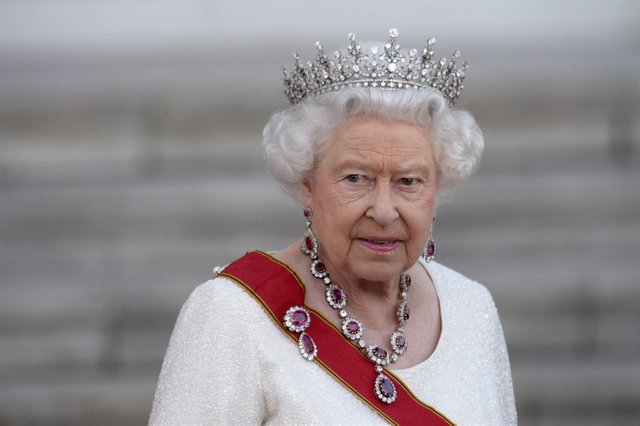
The Royal African Company
King Charles II encouraged the expansion of the slave trade. He granted a charter to a group of men, the Royal Adventurers, who later became the Royal African Company (RAC). The king and the Duke of York backed this enterprise by investing private funds. The charter stated that the Company 'had the whole, entire and only trade for buying and selling bartering and exchanging of for or with any Negroes, slaves, goods, wares, merchandise whatsoever'. The king therefore gave full support to this system of trading.
The first Royal African Company ships sailed from Liverpool and Bristol to develop their commercial activity along the West African coast. Over the next two centuries, these two cities grew from the profits of the slave trade.
London and the Slave Trade
All over Britain families benefited from the Atlantic slave trade. Bristol and Liverpool were the most important ports. Approximately 1.5 million enslaved people - about half those taken by the British from Africa - were carried in ships from Liverpool. London was also one of the main trading centres (particularly in earlier years of the slave trade) because of the transport links provided by the River Thames and the London docks. Merchants based in Blackheath, Deptford and Greenwich handled some 75% of sugar imports.
A number of Londoners closely involved with the Atlantic slave trade developed their businesses in this prime location. For example, Ambrose Crowley, an iron merchant, produced manacles and irons for tethering slaves on ships. John Angerstein, a Blackheath merchant and founder of Lloyd's of London, owned estates in Grenada. The Pett family, master shipbuilders in Deptford, built many of the ships that were involved in the Atlantic trade. Woodlands from their estate (today's Petts Wood) provided timber for their shipbuilding business. The East India Company also had ships built at Deptford.
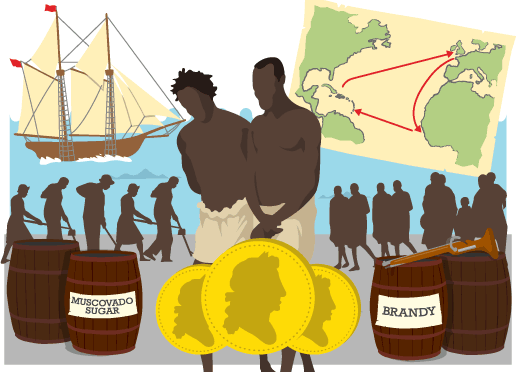
Guns for Slaves
The slave trade had a major impact on Britain's economy. Ships loaded with goods left Britain for the West African coast. There, commodities were bartered for all manner of tropical products, including humans. Military supplies were regularly shipped to forts in West Africa. Royal African Company schedules reveal a methodical record-keeping system for exchanging brass rods, cutlery and guns manufactured in Birmingham. The historian F. W. Hackwood argues that the West African slave trade was the chief supporter of the gun industry in Wednesbury and Darlaston, and gunsmiths in the Midlands produced most of the 150,000 guns which British ships exchanged annually for Africans.
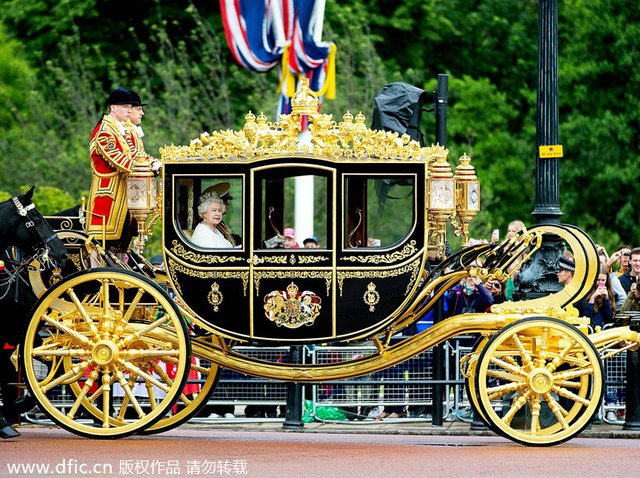
The Triangular Trade
Ships rarely travelled empty. British shipbuilders constructed specially built vessels for the slave trade. Ships designed to carry human cargo from Africa would be converted to hold raw materials such as rum, tobacco, molasses and sugar, collected from the West Indies. To complete the cycle known as the 'triangular trade', these raw materials were then brought back to England to be turned into manufactured goods. These goods were then sold on at considerable profit in Britain and Europe. There can be little doubt that such a system of trade substantially boosted the development of Britain's commerce and manufacturing.

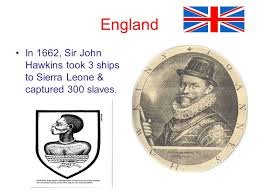
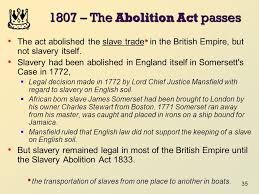
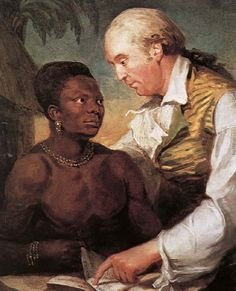
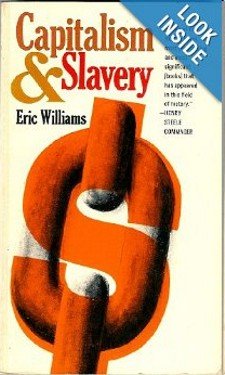

References and Further Reading
Blackburn, R., The Making of New World Slavery, London, 1997
Clarkson, T., History of the Rise, Progress and Accomplishment of the Abolition of the African Slave Trade by the British Parliament, London, 1808
Curtin, P. D., The Atlantic Slave Trade: A Census, London, 1969
Curtin, P. D., Death by Migration: Europe's Encounter with the Tropical World in the Nineteenth Century, Cambridge, 1989
Dresser, M., Slavery Obscured: The Social History of the Slave Trade in an English Provincial Port, London, 2001
Elder, M., The Slave Trade and the Economic Development of 18th-century Lancaster, Halifax, 1992
Hackwood, F. W., A History of Darlaston, near Wednesbury, Handsworth, 1908
Knight, D., Gentlemen of Fortune: The Men who Made their Fortunes in Britain's Slave Colonies, London, 1978
Martin, S.I., Britain's Slave Trade, London, 1999
Tattersfield, N., The Forgotten Trade, London, 1991
Thomas, H., The Slave Trade, London, 1998
Walvin, J., Black and White: The Negro and English Society 1555-1945, Aylesbury, 1973
Walvin, J., Black Ivory: Slavery in the British Empire (2nd edn), London, 2001
the queen is the largest landholder on earth. the british royal family are the most successful thieves there are. they have stolen from every human family alive. way to make it about africa and white guilt. didn't see anybody else abolishing slavery. not for a while.